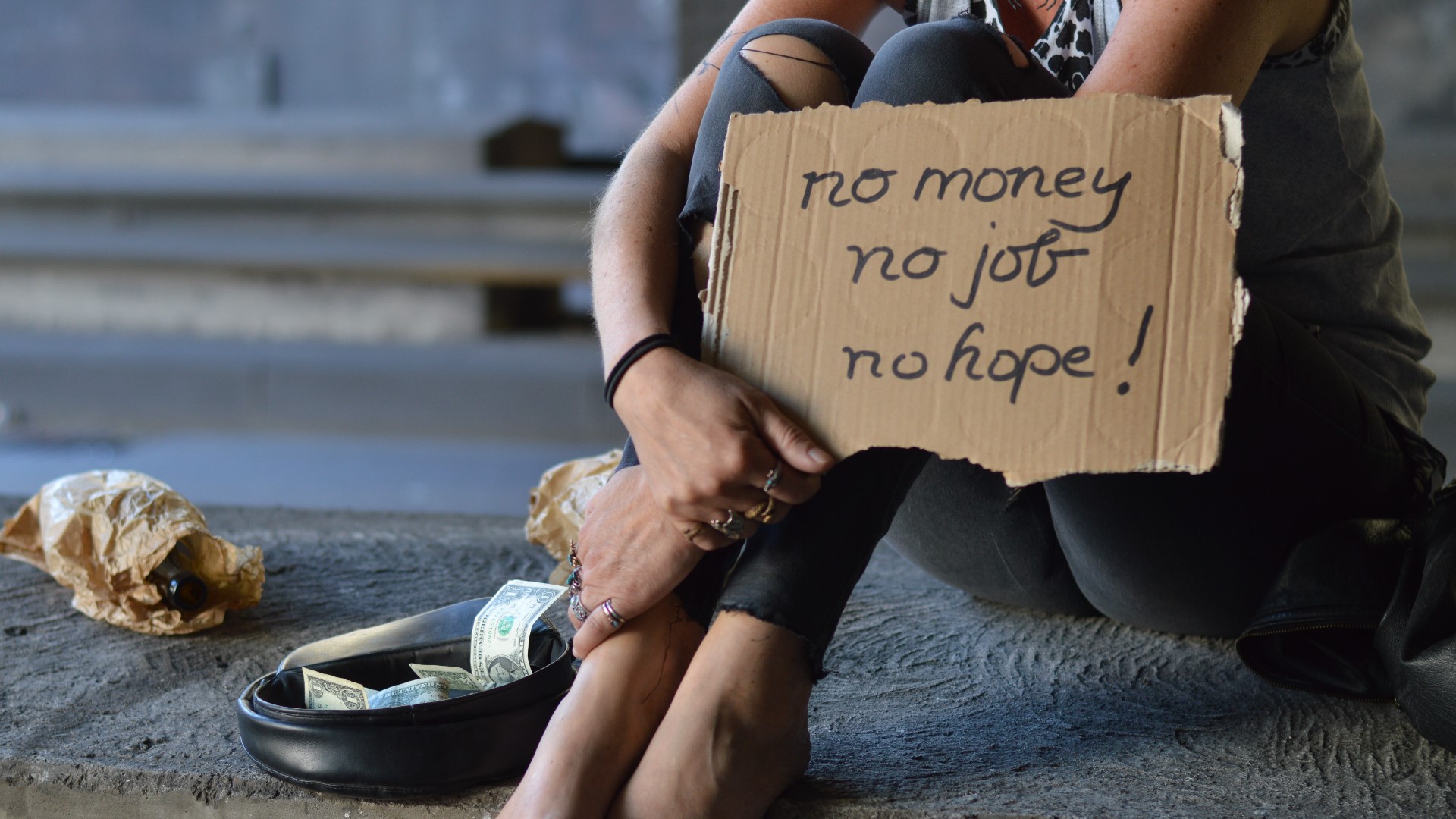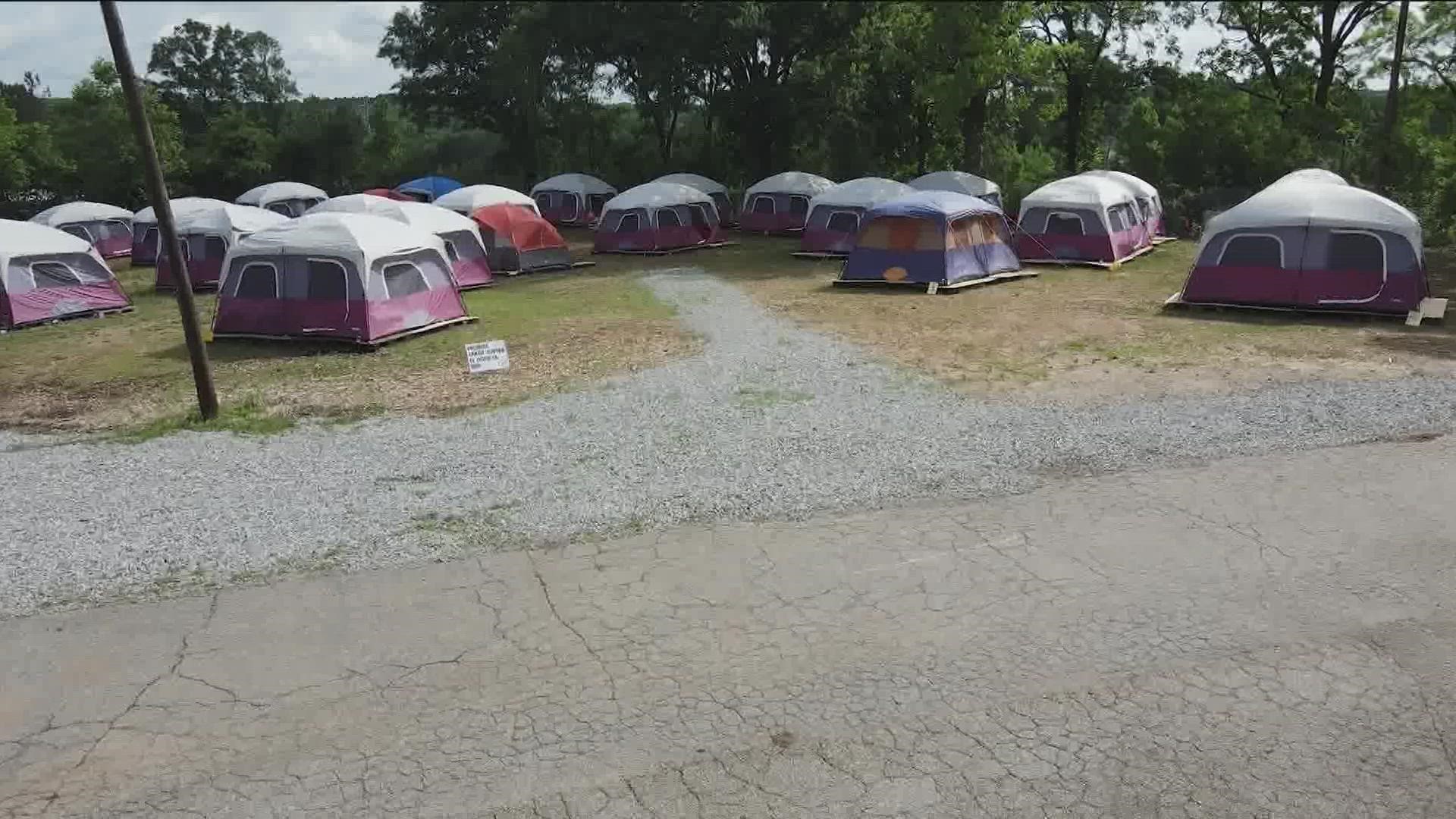'I didn't want to die' | People, organizations, cities work to help people find housing
Through several programs, people -- and even the City of Athens -- have pushed to end homelessness. But many of these solutions require more hard cold cash.

Finding permanent solutions for people without homes has been a struggle locally and nationwide. And through different programs and willing people, some resolutions are coming about.
There are many nonprofits and people ready to help those without housing. And even a city in Georgia has opened a legal encampment for people to live until they are ready to find a permanent place.
Through all this work, everyone working to end homelessness agrees that it requires funding, and more than any of them are allocated now.
Athens opens government-sanctioned encampment
In Athens, they have a government-sanctioned encampment. It is a fenced-in, security-enforced area with bathrooms, food, recreational activities and dozens of tents. The tents are meant to give people without homes a safe place to live temporarily; the key word is “temporarily.”
“We are first step, alternative housing community, which means that we’re not housing anyone to keep them homeless,” said Tershant Smith, the project director.
Records from First Step show that the encampment can serve 55 people at one time, and projects it will help 660 people after a year.
During their first five months, First Step said that 160 people used the camp and that 13%, or roughly 20 people, went into permanent housing. Another 6%, or roughly 10 people, went into a treatment program.
The 75 others left the encampment but didn't go into permanent housing or treatment. The city said it doesn't keep a record of where those people go, but at the end of the year, it would track if anyone who had left the encampment returned.
And though this idea is serving many, the National Coalition for the Homeless is strongly against the model, saying, “A tent is not a permanent solution to homelessness.” It accuses governments of using it as a solution instead of focusing on what it says is the real problem, a lack of affordable housing. But Hardy said a home won’t fix everyone’s issues.
BELOW | Data from First Step
“If you take a person 10 years in the woods and put them in an apartment, they ain't got no job, they don't understand how to work a microwave, they don’t know how to pay their rent, they don’t know how to get on a computer,” Smith said.
Nearly $2.5 million has been allocated for the project. Some of that money came from the American Rescue Plan. Hardy's contract is set to go into 2023.
The Personal Touch
Not every outreach mission to help people experiencing homelessness is through the government. Many organizations and foundations are born of people who just want to support and from some who know what it's like to not have a place to lay their head.
The number of people without housing in the city of Atlanta has decreased in recent years, but that hasn't made a dent in those experiencing chronic homelessness. This means that the person has lived out on the streets for over a year because of mental and physical disabilities or is currently dealing with active drug addiction.
Tracy Thompson believes that even those who are experiencing chronic homelessness can find the way home because she's been in their shoes and is willing to help. Every weekend Thompson comes to the back corner of an apartment complex near Cheshire Bridge Road. She, with a team of volunteers, pass out clothes, food and toiletries to people that are homeless and living nearby.
However, Thompson doesn't just stop at the parking lots; she walks up the hill next to the apartments to a steep, rocky dirt road that opens up to a community of tents, surrounded by freeways and the frenzy of the "normal life."
The tents of people may be hidden in the trees where no one else can see, but Thompson said she sees them. This isn't a weekend gig; Thompson considers herself on call every hour of every day, waiting for that moment someone says, “I’m ready.”
“My goal is to help people get housed, ultimately who want to be housed,” Thompson said. “Often something happens that [make them] say, "OK, I just can’t deal with this anymore.’ I try to be available when that day happens for somebody.”
Thompson understands that moment because seven years ago, it happened for her, and she sought out a shelter for help.
“I got the courage. I knocked on the door. Nobody came to the door," Thompson recalled. "I remember standing in the rain just feeling so defeated."
That day, Thompson said she was eventually told she couldn't enter without a referral, but no one helped her get one or even an umbrella for that matter.
“I remember walking, and I can cry today remembering how, how alone and afraid and helpless. I just wanted to give up," she said. "I had nowhere to go. I didn’t know what to do.”
Which is what brought her back to what she knew and ultimately feared - the encampment. When Thompson first ended up on the streets, she was struggling with an alcohol use disorder, trying to escape an abusive relationship. But while she was walking the streets away from these problems, the abuse found her anyway.
“I got beat up. I don’t know who hit me. I don’t know what happened to me. Someone led me to 911,” Thompson said.
She ended up at Grady, where a social worker looked to find Thompson a safe place to live. For the next six months, with the help of a caseworker, Thompson poured into programs, working on restoring her mental health and finding permanent housing and a place to work.
“I didn’t want to go back outdoors and I didn’t want to get beat up again," she said. "I didn’t want to get hurt; I didn’t want to die.”
Now she has a safe home where she can rebuild all that's lost. However, Thompson is still drawn to the streets, not to live - but serve.
“There was a couple that inspired me. They would come around on Saturdays. They would bring food, T-shirts, socks, undergarments. Just so positive and caring,” she explained. “That inspired me to do what I do today.”
She started a non-profit that bears her middle name, Elizabeth.
“The Elizabeth Foundation," she said. "We learned Elizabeth, one meaning is oath to God. And in my heart I knew, I told myself if I ever get out of this, I’ll come back.”
A helping hand that truly understands, Thompson knows all too well the shame and guilt, remorse and fear that can come with being homeless. And with each visit to the hill and each phone call, she tries to counter it all with love.
Dedicated funding
What seems like an obvious solution to helping people find permanent housing hasn't been the easiest, but one local non-profit said they'll dare to try it - build more homes.
Partners for Home is a non-profit focused on finding permanent housing for people, and their CEO said housing is the only solution to end homelessness.
“Without a roof over our head, we can’t get sober, we can’t get mental health treatment, we can’t get a job,” Cathryn Vassell, the CEO of Partners for Home, said.
And that path to more homes needs to be paved with cash. The nonprofit is putting millions of dollars into a supportive housing plan where rent would be on a sliding scale all the way down to $0. Supportive housing also allows tenants to participate in other programs centered around getting them on their feet.
Partners for Homes is investing roughly $22 million to build 550 new units. One complex already a part of that model and serving the Atlanta community is called 55 Milton. The complex promises about 18 units to be set aside for people without permanent housing over the next 15 years. Vassell said supportive housing is ramping up in Atlanta and getting us on track to end homelessness with one potential roadblock.
“Most communities have some kind of dedicated revenue stream in addition to what they get from HUD [United States Department of Housing and Urban Development], and Atlanta and the state of Georgia do not have that,” Vassell said.
And Partner for Homes said they do consistently receive money from HUD, about $10 million in 2022, but when it comes to money from the city, they aren't ever sure what they are getting.
11Alive tried tracking down how much the City of Atlanta contributes every year toward ending homelessness, but the city itself couldn’t provide a number, saying, “it’s complicated.”
Atlanta could only provide a spreadsheet for the money it's allocated to Partners for Home, and even that didn’t have clear data, nor did the city clarify the amounts.
“We need to secure dedicated revenue so that we’re not continuously expanding and contracting,” Vassell said.
Mayor Andre Dickens announced at a conference over the summer that $6.2 million of Atlanta's American Rescue Plan funds would "go to work on behalf of those experiencing homelessness,” but that money seems like one-time funding.
Taxes, Vassell said, are the best ways to get that dedicated revenue. And while she admitted that’s not a word taxpayers like to hear, she believes there is support from the community for the mission to help people find permanent housing.
If we don’t see a dedicated revenue stream, Vassel said the influx of supportive housing would shrink, leaving more people without a roof over their heads, continuing the cycle.
11Alive Investigators are examing why tents line Atlanta's freeways and why families struggle to find stable housing in their three-part series The Way Home. Read Part 1: The Problem and Part 2: The Cause.


